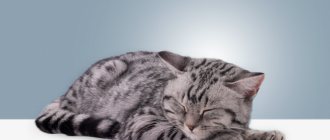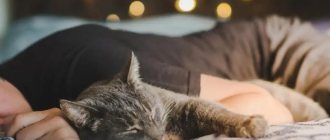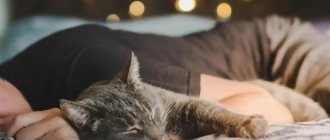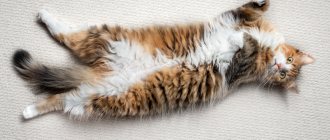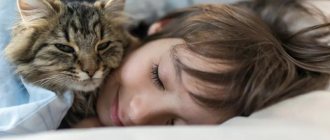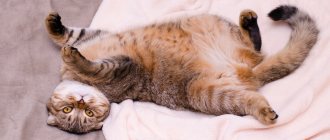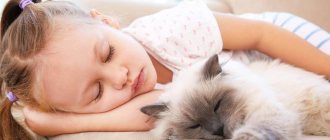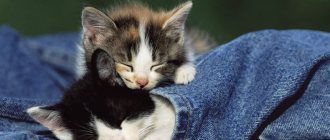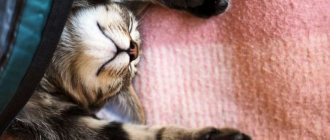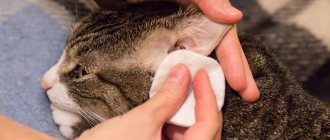All owners of furry pets are well aware that adult cats are real sleep gurus. They can sleep anywhere, in any position and at any time, just look at funny photographs of animals sleeping in the most unexpected places. An adult cat sleeps on average about 13 - 16 hours a day, this is usually enough for him to replenish his strength and restore, and out of boredom he can doze off for some time, which is observed in the summer, when animals become lazy and sedentary from the heat who prefer wallowing in the cold to active games. Why a cat sleeps longer than 2/3 of the day needs to be understood. There are both completely harmless causes of cat sleep disturbance, and formidable pathologies that threaten the health and even the life of a pet.
If a cat sleeps all the time, is this normal or pathological?
Long-term sleep is inherent in cat genes and is the result of evolution - domestic cats do not need to hunt in order to get food, as well as to conquer territory. An adult animal can sleep up to 20 hours a day, that is, the time between meals. This occurs in situations where the cat is alone at home all day or no one pays attention to it. The first answer to the question of why cats sleep a lot is boredom - caressed and fed pets have nothing else to do.
Cats do not always sleep soundly; most of the time they are in a state of drowsiness, which is characterized by a completely relaxed posture and closed eyes, but at the same time a readiness to wake up at any moment. This is indicated by:
- twitching ears;
- purring;
- reaction to the slightest noise;
- periodic stretching and other body movements.
A cat's deep sleep is characterized by tightly closed eyes, a curled up body, a tail on its face, and even light snoring. The twitching of a cat's whiskers and paws in a dream indicates that he is having dreams - all pets have the ability to see them.
Caring owners are well aware of all the habits of their pets, including the duration and characteristics of their sleep. Any change in habits can be pathological.
Diagnostics
The main difficulty in identifying the cause of weight loss is that it can be a sign of various disorders. Therefore, an in-person consultation with a veterinarian and a detailed examination is necessary.
In order to make an accurate diagnosis, tests are taken
It is imperative to undergo tests, since only they allow you to present a complete picture of the disease. In order to understand why a cat is losing weight, a general and biochemical blood test is prescribed, urine and feces are studied. Already these data will give an idea of the work of internal organs.
It is advisable to take an x-ray of the abdomen and chest. Treatment is prescribed only after the exact cause of weight loss has been established. If the animal has a small amount of fur accumulated, then a special paste is sufficient.
If an inflammatory process is detected in the mouth, it is recommended to clean the tartar and use healing ointments. This hygiene procedure should be done once a year.
The most difficult thing is to correct hormonal disorders. During heat, the animal behaves inappropriately and this cannot be changed in any way. Light sedatives will not completely eliminate sexual desire. Therefore, it is better to castrate and sterilize non-breeding animals.
Important! The operation is completely safe for pets and improves their quality of life.
The heat does not always occur in the spring. In some animals it occurs at any time of the year. Sterilization helps protect your cat from developing mammary cancer. Castration of males is not so traumatic and allows you to wean the cat from marking its territory.
A cat may be thin due to worms. In this case, a course of special medications is sufficient. They should only be prescribed by a doctor, since the type of parasites and the degree of infestation matter.
Serious diseases are the most difficult to treat. In oncology, much depends on the size of the tumor and its location. In some cases, surgery can extend the life of a pet.
The earlier the problem is identified, the greater the chances of its successful treatment.
Bacterial infections are treated with a course of antibiotics, viral diseases with supportive medications. If a cat has discharge from the eyes, the owner should clean them regularly.
In addition to treatment, it is important to create special conditions for the pet’s recovery. To do this, they will organize a quiet and peaceful place for him to relax. The cat is allowed to sleep as much as he wants. During the treatment period, he is provided with nutritious, high-quality nutrition.
Popular brands of food have special dietary lines that allow you to provide the animal with all the necessary vitamins and minerals.
Important! If a cat's teeth fall out, it is provided with soft food during this period. Pates or baby meat puree are suitable.
Constant sleep - is it normal or a deviation?
The duration of sleep directly depends on the conditions in which the cat lives. Street animals sleep much less than domestic animals, and all because they need to make an effort to feed themselves - hunt mice, look for food and even take it from their fellow animals. They more than make up for the energy expended on hunting and street fighting during long sleep, amounting to about 13–15 hours a day.
Pets, especially those that do not go outside, live on everything ready-made. They do not need to get their own food, protect their territory and take care of their offspring. Out of boredom and idleness, they can sleep 20 or more hours a day, and this will be considered their norm. We can talk about a deviation in situations where the animal’s long sleep is accompanied by lethargy, apathy, refusal to eat and other similar symptoms that require immediate contact with a veterinarian.
We figured out why cats sleep for a long time - from boredom, idleness, cloudy weather, and also to save energy. The length of time a pet sleeps is directly affected by its breed, temperament, age and living conditions. Sleep may lengthen for several reasons:
- severe fatigue;
- stress;
- the weather is too hot or, conversely, too cold;
- vaccination or surgery;
- castration or sterilization;
- pregnancy.
Older cats sleep much more than younger ones, this is due to the aging of its organs and systems and the slowdown of metabolic processes in the body. Be sure to pay attention to the duration of sleep; its increase may be the first symptom of the disease.
What else affects sleep duration?
In addition to age, other internal factors, as well as some external ones, influence individual sleep duration. Because of this, pets of the same age require completely different amounts of time to rest.
Satiety
If a cat sleeps peacefully all day, then he does not feel hungry. He uses all this time to digest food. Animals that eat high-protein foods rest especially long.
Physical activity
The energy spent during outdoor games is restored during sleep. But this does not mean that the main couch potatoes are energetic and playful pets. In their case, the time of falling asleep coincides with the end of the game. Having recharged, they are ready for new adventures.
External (including weather) conditions
The calmer, more comfortable and quiet the environment in the room, the easier it is for the animal to fall asleep. Pets sleep the longest when their owners are away. If you install hidden cameras, you can see that the mustachioed pets get up just to drink water.
Sleep duration increases during rainy weather and hot summers. If your pet rests for a long time during the heating season, then dry air is to blame.
Some animals are sensitive to weather conditions. If it’s gray and rainy outside, the pet will sleep almost all the time, except for feeding and going to the toilet.
Breed
The character traits of different breeds are no less important. Persians, Ragdolls, Devon Rexes, Britons and Scots sleep the longest. They are quite lazy and often fall asleep immediately after eating.
More active breeds include Abyssinians, Siberians, Bengals, Siamese, Kurilian Bobtails and Egyptian Mau. Representatives of these breeds love active games with their owner and hunting, so with enough attention they are constantly on the move.
Health status
Representatives of the cat family are good at capturing other people's emotions. A quarrel between beloved owners can cause them great anxiety and worry. When under constant stress during a move or other exciting event, they will hide in secluded places and sleep longer than usual. Also, the reason may lie in the disease.
Long sleep as a sign of illness
If you are concerned about why your cat is constantly sleeping, since this has not been observed before, this is a good reason to contact a veterinarian, who, after examining the animal, will be able to identify a developing pathology. An increased duration of sleep indicates a disease in a cat if it is accompanied by other symptoms:
- increased body temperature;
- lethargy and apathy;
- nausea and vomiting;
- hoarse breathing and runny nose;
- matted wool;
- causeless meowing and aggression.
The above symptoms observed in a domestic cat or cat may indicate food poisoning, surges in blood pressure, viral and bacterial infections, helminthiasis, hypovitaminosis, the appearance of fleas and other parasites. We cannot discount anemia, which can develop due to poor nutrition or internal bleeding, endocrine disorders, diseases of the musculoskeletal system, and even oncology. A veterinarian will be able to make an accurate diagnosis after receiving test results and examination.
The cat is lethargic and sleeps all the time: what is the reason?
Among the pathological causes of lethargy are the following:
- poisoning,
- hormonal disorders after childbirth or as a result of using contraceptives,
- side effects of corticosteroid anti-inflammatory drugs,
- musculoskeletal pathologies,
- infectious diseases,
- worms;
- anemia;
- hypovitaminosis;
- tumors;
- chronic diseases.
Stress causes ambivalence in cats. The pet may become sleepy or, conversely, show aggression.
Constant sleep after spaying and neutering
Sterilization and castration, which pet owners often resort to, is another reason why cats sleep all the time, both during the day and at night. Both sterilization and castration are serious interventions in the functioning of the organs and systems of the animal’s body. After the operation, the cat experiences serious stress; this condition requires full recovery, which the animal can receive in a dream. Hormonal changes in the body of a pet after sterilization or castration cannot be discounted. The cat or cat will be lethargic, drowsy and apathetic until the restructuring of hormones is completed and their body begins to function as before.
When a cat's condition should cause alarm
The owner of the animal should be wary of prolonged fasting. For kittens the critical period is one day, for older pets - 2; cats for three days. An alarming sign is refusal to drink, a drop in temperature below normal, and excessive salivation.
Be sure to read:
What to do, the cat is sneezing, the eyes are watery or festering, reasons
In such situations, emergency veterinary care is required.
How to change your indoor cat's sleep pattern?
The sleep schedule of a domestic cat or cat needs to be changed in situations where the animal sleeps during the day and is awake at night, preventing other family members from resting. This behavior does not lead to anything good - the owners feel irritated and take out their anger on the pet, which, in turn, begins to take revenge - the problem worsens even more.
The normal sleep pattern of a domestic cat can be restored by moderate activity during the day, the attention of the owners and dense food in the evening, as well as a minimum of reasons for alarming the animal and the complete elimination of stress.
Domestic cats sleep long and sweetly, which is a variant of the norm. But if long and restless sleep is accompanied by lethargy, refusal to eat and other dangerous symptoms, do not delay a visit to the veterinarian - early treatment can prevent the development of a serious disease that threatens the health and life of your pet.
See also: a cat sleeps at the owner’s feet - reasons
Actions for drowsiness in kittens
In the absence of pathological reasons, you can ensure normal development of the baby and shorten the duration of sleep as follows:
- choose the right diet;
- avoid overeating or starvation;
- protect from external noise;
- arrange a place to sleep;
- do not disturb during sleep;
- watch out for small children who may harm kittens;
- provide access to fresh air in the apartment or house;
- carry out preventive protection against helminths and fleas.
If the cat constantly sleeps, looks sick, refuses to eat, or has other alarming symptoms, it needs to be shown to a veterinarian.
At an early age, not all animals are the same, even if they were born by the same mother. Strong babies quickly adapt to the external environment and new nutrition, while weak ones require more effort. If a kitten sleeps for a long time and plays little, this does not mean that he is sick. The main indicator of health is a good appetite. In this case, food should be nutritious and age-appropriate. Mature kittens aged about 4 months can sleep for a long time during the day due to their nocturnal lifestyle. If the baby is raging, rolling up rugs, at night, during the day he regains his strength. Purrs that live outside come into the house occasionally and sleep less than their indoor relatives.
Reasons for refusal to eat due to cat illness
Oral diseases. Stomatitis is an inflammation of the oral mucosa involving the mucous membranes of the cheeks, palate, gums, surface of the tongue and the mucous membrane of the lips. In cats, catarrhal, vesicular and hemorrhagic most often occur, and much less often ulcerative, diphtheretic and phlegmonous.
Stomatitis in a cat usually begins with catarrhal inflammation of the oral mucosa and is accompanied by: Increased salivation. Increased thirst. Chew carefully while eating (cat stomatitis).
Dental caries is a disease accompanied by progressive putrefactive destruction of hard tissues followed by the formation of a cavity in the affected tooth. The onset of dental caries development is usually overlooked by cat owners. The owner of a cat can detect dental caries in his cat due to difficulty in eating and chewing food, as a result of the appearance of a pain reaction, the presence of salivation, the loss of swallowed food particles from the oral cavity and an unpleasant odor (bad breath in a cat) that comes from the cat’s oral cavity, purulent or bloody discharge from the mouth.
Tartar. An unpleasant odor emanates from the cat’s mouth, we note atypical behavior in the cat when eating (arising from pain), the cat begins to refuse food, and exhaustion is observed (tartar in the cat).
Wounds and abscesses in the cat's mouth are accompanied by pain, which makes it difficult for the cat to eat, and as a result the cat refuses to eat.
Ear disease. Ear diseases in cats can be non-contagious or contagious in origin.
Otitis. Otitis in cats can be due to inflammation of the outer, middle and inner ear.
Causes of otitis. The cause of otitis in cats can be food allergies, the presence of parasites (ticks, fleas), ear injuries, foreign bodies, etc. Otitis of the middle and inner ear can be the result of complications of inflammation of the outer ear.
Signs of otitis. During a clinical examination of a sick cat, the skin of the sore ear is reddened, the cat rubs the sore ear with its paw, and tries to keep the sore ear folded and pressed to its head. If the pain in the ear is acute, “shooting,” the cat suddenly jumps up, looks around in fear, and screams. With constant pain, the cat does not allow the sore ear to be touched, avoids stroking the head, and presses the sore ear to its bedding. With purulent otitis media, inflammatory exudate is released from the cat's ear; when touched, the ear gurgles and squelches. An unpleasant odor emanates from the diseased ear. In advanced cases, in the absence of proper treatment, the cat’s body temperature rises, the cat becomes depressed, and there is no appetite. If timely treatment measures are not taken, the eardrum may be perforated, and the inflammatory process can spread to the brain (ear diseases in cats).
Signal of a foreign body entering the digestive tract
Most owners often encounter this problem, which is especially typical for playful cats of long-haired breeds. These could be small fragments of toys, small bones, or simply large accumulations of fur from the animal itself. The main signs for identifying this factor are attacks of vomiting that occur when drinking water and food, abdominal pain and difficulty defecating. With prompt diagnosis and timely removal of the foreign material, the pet will recover completely.
